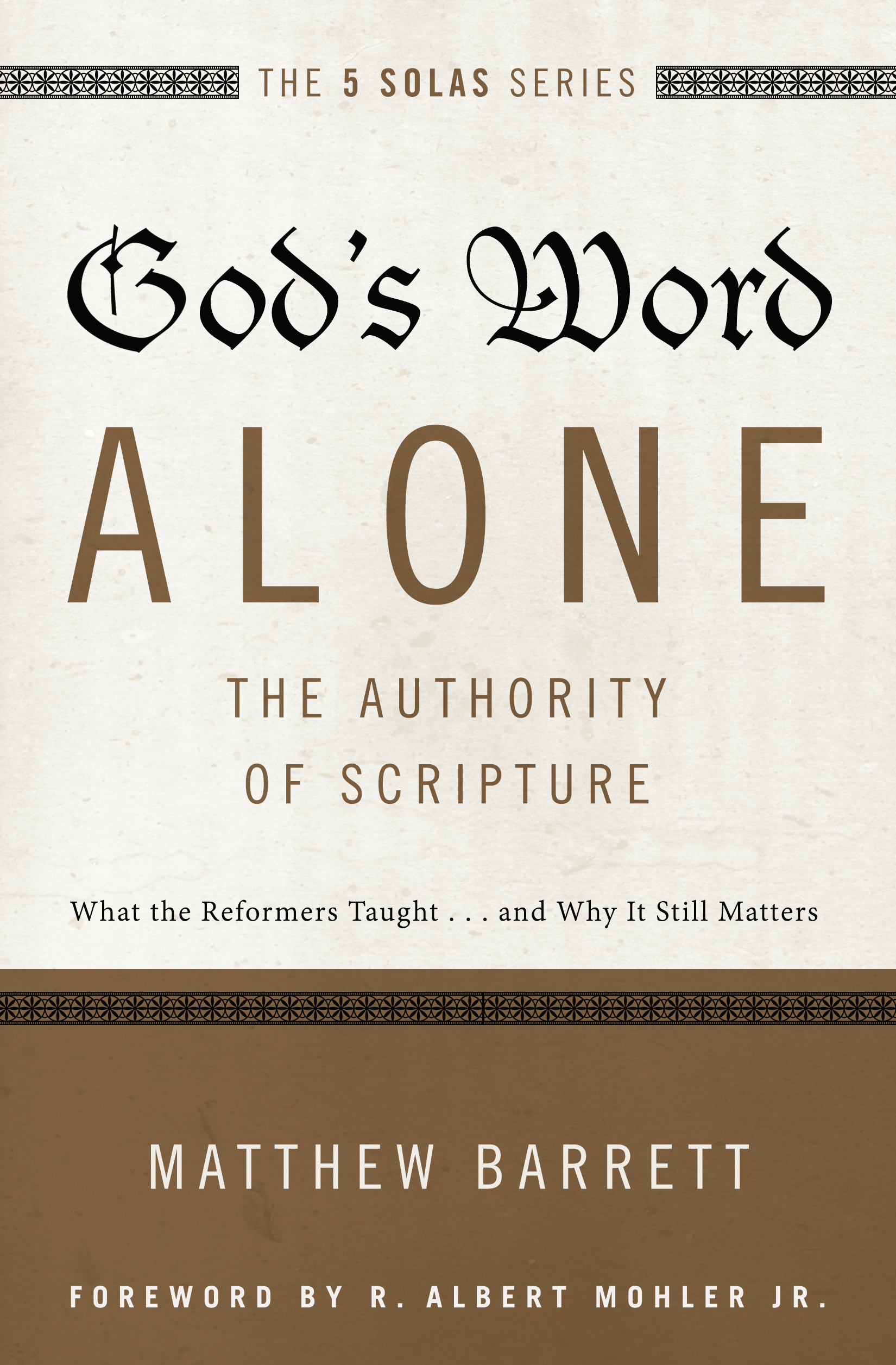A Brief Book Summary from Books At a Glance
About the Author
Matthew Barrett (PhD, The Southern Baptist Theological Seminary) is Tutor of systematic theology and church history at Oak Hill Theological College in London, executive editor of Credo Magazine, and the author and editor of several books. Barrett is the editor of the Five Solas Series.
Introduction
In this contribution to the Five Solas Series, Barrett examines the doctrine of sola Scriptura. He looks at the teaching of the Reformers and the difference between their views and the view of the Roman Catholic Church on the matters of Scripture and Tradition. Barrett carefully exposits what sola Scriptura is and also what it is not. He unfolds the attributes of Scripture and makes a cogent case for the authority, necessity, clarity, sufficiency, and inerrancy of Scripture, grounded in the fact that all Scripture is God-breathed and is God’s Word. This is a very accessible historical, exegetical, and theological treatment.
Table of Contents
Introduction: Sola Scriptura
Chapter 1 – The Road to Reformation: Biblical Authority in the Sixteenth Century
Chapter 2 – The Modern Shift in Authority: The Enlightenment, Liberalism, and Liberalism’s Nemeses
Chapter 3 – Today’s Crisis over Biblical Authority: Evangelicalism’s Apologetic and the Postmodern Turn
Chapter 4 – God’s Word in the Economy of the Gospel: Covenant, Trinity, and the Necessity of a Saving Word
Chapter 5 – God Speaks Covenantal Words: Creation, Fall, and the Longing for a Better World
Chapter 6 – God’s Covenantal Word Proves True: Christ, the Word Made Flesh
Chapter 7 – God Speaks with Authority: The Inspiration of Scripture
Chapter 8 – God Speaks Truthfully: The Inerrancy of Scripture
Chapter 9 – God Speaks to Be Heard: The Clarity of Scripture
Chapter 10 – God’s Speech is Enough: The Sufficiency of Scripture
Conclusion: Always Reforming according to the Word of God
Summary
Chapter One – The Road to Reformation: Biblical Authority in the Sixteenth Century
As the sale of indulgences grew more corrupt and confusing, Luther posted his 95 Theses for academic debate. The underlying issue was one of authority: did the pope and the church have final authority, or was it the Word of God alone? Luther held that church councils and popes might err, but Scripture was infallible and the final authority. The pope was not an infallible interpreter of Scripture. Only Scripture was without error since it was God-breathed; popes and councils had all erred and contradicted one another. Despite being publicly censured and condemned, Luther refused to recant. Although the early church fathers believed that tradition was an important handmaid to interpreting Scripture, the Roman Catholic Church of Luther’s day had made Tradition and Scripture equal in authority. In practical terms this made Tradition the final authority, since Tradition interpreted the Scriptures. One of the many problems with this position was that the Great Schism saw three popes existing at the same time, all excommunicating one another and their followers. There simply was no one “Tradition.” One of the reasons Luther labored so diligently in Bible translation was that he truly believed the Scriptures would defeat the claims of his opponents.
Huldrych Zwingli also came to hold to sola Scriptura. He centered his teaching and preaching ministry on the successive exposition of biblical books. His opponents accused him of rejecting all tradition and thinking that tradition was irrelevant. Neither Zwingli nor Luther held this extreme position. They believed that tradition was important, but not of equal value and authority with Scripture. The radical reformers rejected tradition, but the mainstream reformers did not. Tyndale, like Luther, saw the need for translating the Scriptures into the vernacular of the people. They believed that Scripture interprets Scripture and that the Bible is a living book that transforms lives and changes minds.
John Calvin also contended for sola Scriptura. He meticulously pointed out corruptions, distortions, and contradictions in Catholic Tradition. In the Institutes Calvin clearly articulated a doctrine of Scripture. He argued that Scripture is the Word of God and therefore it receives its authority from God, not the church. As black and white attest to their own color, so Scripture attests to its own truth. Only the Holy Spirit—not human ability or reason—can convince us that Scripture is true, since we must hear God’s voice in Scripture to know that God is the author of it. All Scripture is infallible and inerrant and fully authoritative. Despite the arguments of the Reformers, the Roman Catholic Church persisted in holding to Tradition as an equal authority to Scripture, with the Church’s Tradition being the infallible interpreter of Scripture. This is still the position the Catholic Church holds today.
Chapter Two – The Modern Shift in Authority: The Enlightenment, Liberalism, and Liberalism’s Nemeses
The Enlightenment postulated that human reason alone was sufficient to throw off the shackles of religious tradition. Autonomous reason would allow people to have unbiased, objective knowledge. Human nature was good, not depraved, so special revelation was not required as a corrective. Descartes’ methodological doubt severed human knowledge and certainty from God’s revelation. At first, many thinkers thought that the Bible passed all tests of reason. Then some began to argue that if the Bible was reasonable, its truths could be known by reason alone. This led to the exaltation of reason over the Bible, with reason standing over Scripture as a judge. Deism precluded God’s intervention in the world, which eliminated special revelation and left reason supreme. Rationalist biblical criticism (RBC) was not only a methodological approach to studying Scripture, it was based on a worldview of anti-supernaturalism…
[To continue reading this summary, please see below....]The remainder of this article is premium content. Become a member to continue reading.
Already have an account? Sign In
